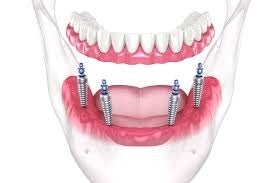
Dental implants are fixed tooth replacements anchored directly into the jawbone through a surgical procedure. Each implant acts as a stable base for a crown, bridge, or denture, functioning similarly to a natural tooth root. Because they are embedded into the bone, implants provide long-term stability and help maintain jaw structure over time.
Dentures are removable devices used to replace missing teeth and surrounding tissue. They rest on the gums and may be secured with adhesives or clasps. Full dentures replace an entire arch of teeth, while partial dentures fill gaps between remaining natural teeth. Although generally less invasive to receive, dentures may require adjustments for fit and comfort as the mouth changes.
Both options restore function and appearance after tooth loss but differ significantly in how they are applied, maintained, and integrated into daily life.
Cost Comparison
Dentures are generally more affordable at the outset, with pricing typically between $800 and $3,000 per arch depending on materials and whether the denture is full or partial. However, they often require ongoing maintenance, such as relining, repairs, or replacement due to changes in jawbone structure over time.
Dental implants involve a significantly higher initial cost, usually ranging from $3,000 to $5,000 per tooth. This includes the implant post, abutment, and crown. While the upfront expense is greater, implants are built to last and may eliminate the need for repeated dental work, making them more cost-effective over the long term.
Patients comparing both options should weigh not just the initial fee, but the total investment over several years, including potential replacements, maintenance visits, and the impact on oral health.
Comfort and Functionality
Dentures can cause irritation or pressure spots, especially if the fit becomes loose over time. Slippage while eating or speaking is common without proper adhesive or alignment, which can affect daily activities and overall confidence. Hard or sticky foods often need to be avoided to maintain denture stability.
Dental implants, in contrast, are embedded into the jawbone, which allows them to function more like natural teeth. This stability improves chewing efficiency and speech clarity. Unlike dentures, implants do not shift during use, making them more dependable in daily routines and more compatible with a wider range of foods.
For individuals prioritizing consistent function and comfort over time, implants typically provide a more stable and reliable solution.
Maintenance and Longevity
Dentures require daily removal for cleaning and should be stored properly to avoid warping. Over time, changes in jaw shape can affect fit, making periodic adjustments or full replacements necessary. On average, dentures last between 5 and 10 years depending on care and material quality.
According to the team at311 Dental, dental implants are cared for just like natural teeth - with regular brushing, flossing, and routine dental checkups. Their integration with the jawbone ensures long-term stability and minimizes the risk of shifting or loosening. With proper maintenance, implants can last 15 years or more, often without needing replacement.
Patients interested in long-term solutions may want to consider dental implants as they offer a more permanent option with fewer maintenance demands over time.
Impact on Oral Health
Dentures rest on the gums and do not stimulate the jawbone. Over time, this lack of stimulation can lead to bone loss, which may alter facial structure and affect the fit of the denture. Jaw shrinkage can also contribute to additional dental issues and require repeated adjustments.
Dental implants, on the other hand, integrate with the bone and help maintain its density. This interaction reduces the risk of bone deterioration and supports the surrounding teeth. Implants also eliminate the need to alter adjacent healthy teeth, which is sometimes required for partial dentures or bridges.
By preserving bone and preventing shifting of nearby teeth, implants contribute positively to long-term oral stability. According to theAmerican Academy of Implant Dentistry, implants are the only dental restoration method that preserves natural bone and helps stimulate growth.
Procedure and Recovery Time
Dentures involve a relatively simple and quick process. Impressions are taken, and the dentures are fabricated to fit the gums. In most cases, patients can begin using them within a few weeks. There is minimal recovery required unless tooth extractions are involved.
Dental implants require a multi-step process that begins with surgical placement of a titanium post into the jawbone. After this stage, a healing period of three to six months allows the implant to fuse with the bone. Once healed, an abutment and crown are added. This timeline can extend further if bone grafting is necessary before implant placement.
While dentures offer faster initial results, implants involve a longer commitment but yield greater stability. According to theMayo Clinic, the healing time for implants varies by individual, but long-term success is closely linked to post-operative care and bone integration.
Suitability and Candidacy
Dentures are an option for most patients, regardless of age or bone density. They are often recommended for individuals who have multiple missing teeth or underlying health conditions that make surgery inadvisable. Dentures can also be a more practical choice for those seeking quicker results without surgical intervention.
Dental implants require sufficient bone volume to support the implant post. Candidates must also be in generally good health to undergo the surgical procedure. Smoking, uncontrolled diabetes, and certain medications can affect healing and may limit eligibility. A thorough dental and medical evaluation is necessary to determine whether implants are a viable option.
Age is not a disqualifier for either treatment, but long-term goals and the condition of the jawbone will influence the recommended solution. Patients should weigh the surgical demands of implants against the maintenance needs of dentures before making a decision.